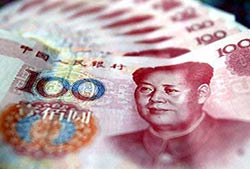China devalues yuan, against back of slower growth

China's central bank has devalued the yuan currency by 1.9%, its lowest rate against the US dollar in almost three years. The so-called “one-off depreciation" is to make the exchange rate more market-oriented and exports cheaper. The move comes after the export-oriented country, which remains the world’s largest manufacturing base, reported weak economic growth, its slowest for six years, from the double-digit rate a few years ago.
In a statement, the US Treasury said that it was too early to judge the full implications of the change. However, the statement added, "We will continue to monitor how these changes are implemented and continue to press China on the pace of its reforms, including additional measures to transition to a market-oriented exchange rate and its stated desire to move towards an economy that is more dependent on domestic demand, which is in China and America's best interests. Any reversal in reforms would be a troubling development."
The move probably comes against the back of a dramatic fall in exports and a slide in producer prices to a near six-year low in July. Exports fell by 8.3% in July, worse than expected, and the producer price index was down 5.4% from a year earlier.
Meanwhile, the world’s second largest economy is also grappling with a stock market collapse and a downward trend of car sales. The weaker economy would also mean the closure of factories and loss of jobs, something the country is trying to avoid.
The country has been under pressure to reform its currency policy as it pushes to become one of the International Monetary Fund (IMF)'s "special drawing rights" (SDR) reserve currencies. These are currencies which IMF members can use to make payments between themselves or to the fund.
However, analysts are wondering if this is a one-time move from Chinese authorities, speculating if the Chinese yuan fixing is reflective of the spot market, it could be positive for its prospects being included in the IMF's special drawing rights basket of currencies this year.
Other analysts point to global ramifications, stating though the devaluation will increase the competitiveness of China's exports, it will reawaken concerns of the Chinese economy to deliver more balanced growth based on stronger domestic consumer demand.
While the yuan is state-controlled it is also heavily influenced by the US dollar, which has been strengthening amidst rising expectations that the Federal Reserve will raise interest rates for the first time in almost a decade this year.
(PRA)Copyright (c) 2015 www.plasticsandrubberasia.com. All rights reserved.









































